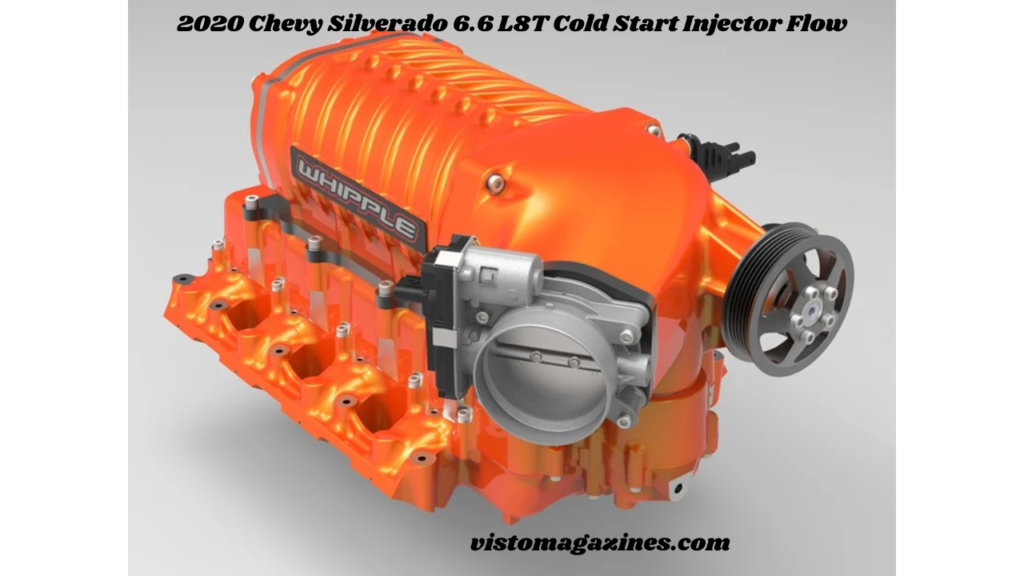The 2020 Chevy Silverado 2500HD and 3500HD models come equipped with the powerhouse 6.6 L8T V8 engine, designed to offer superior performance for both work and recreation. As one of the most popular heavy-duty trucks on the market, the Silverado offers exceptional towing capabilities, rugged durability, and cutting-edge technology. An essential element to the smooth operation of the 6.6 L8T engine is its fuel injection system, particularly the cold start injector flow, which plays a crucial role in engine performance, especially during low temperatures. In this article, we will dive into what makes the cold start injector flow important, how it works, and why it is crucial for the optimal performance of your 2020 Chevy Silverado.
Understanding the 6.6 L8T V8 Engine and Fuel Injection System
Before exploring cold start injector flow, it’s essential to understand the engine and fuel injection system. The 2020 Silverado’s 6.6 L8T V8 engine features a direct fuel injection (DI) system, which means fuel is injected directly into the combustion chamber at high pressure. This system is more efficient than older multi-port injection systems, improving fuel economy and power while reducing emissions. The injectors in this system are critical to maintaining a balanced fuel-to-air mixture, ensuring the engine runs smoothly under all conditions.
The 2020 Chevy Silverado’s 6.6 L8T engine also features advanced electronic controls that optimize fuel injection timing for various driving scenarios. This ensures that your truck performs efficiently, whether towing heavy loads on a hot summer day or driving through sub-zero temperatures during winter.
The Role of Cold Start Injector Flow
Cold start injector flow refers to the operation of the fuel injectors during the engine’s initial startup when the engine is cold, typically after being parked for an extended period. The engine requires a richer fuel mixture to operate and warm up during this time, and the cold start injector flow plays a crucial role in achieving this.
When the engine is cold, the fuel vaporizes less efficiently, and the air-to-fuel ratio must be adjusted to ensure proper combustion. The Engine Control Module (ECM) adjusts fuel flow from the injectors to provide a higher fuel volume, enabling the engine to start quickly and run smoothly. Once the engine heats up to operating temperature, the cold start enrichment process decreases, and the fuel flow returns to normal levels for continued efficient operation.
In the 2020 Chevy Silverado with the 6.6 L8T engine, the vehicle’s ECM closely monitors the cold start process, which controls the timing and quantity of fuel injected into the cylinders. This ensures the engine doesn’t suffer from rough idling or stalling during the initial moments of starting up, shared in colder weather or when an engine is not yet warm.
How Cold Start Injector Flow Works in the 2020 Silverado
The cold start injector flow controls the amount of fuel injected during the startup phase. Here’s a step-by-step breakdown of the process:
- Engine Start: When the driver turns the ignition key or presses the start button, the ECM activates the fuel system and the injectors.
- Cold Start Enrichment: The ECM recognizes that the engine is cold and adjusts the fuel mixture to be more prosperous. This is achieved by increasing the fuel injector flow for a brief period. The cold start injectors may even operate in a dual-pulse mode during this time to ensure there is enough fuel for smooth combustion.
- Fuel Vaporization and Combustion: The fuel mixture is more prosperous with the increased injector flow, compensating for the reduced fuel vaporization at lower temperatures. This allows the engine to start and run smoothly until it warms up.
- Warm-Up Transition: Once the engine reaches a specific temperature, the ECM gradually reduces the cold start enrichment, and the injector flow returns to normal. The truck can run efficiently on the standard air-fuel mixture, maintaining optimal power and fuel efficiency.
Importance of Cold Start Injector Flow for Performance
- Improved Engine Start-Up: Cold start injector flow is crucial for a smooth engine start-up, especially in colder climates. Without this enrichment, the engine may struggle to start, misfire, or run rough, leading to poor performance and potential engine damage.
- Enhanced Fuel Efficiency: Proper cold start injector flow ensures the engine gets the right fuel when needed most. By providing a rich fuel mixture during cold starts, the engine can warm up more efficiently and quickly, reducing the overall strain on the engine and improving fuel efficiency.
- Reduced Emissions: The ability to provide the correct amount of fuel during a cold start helps reduce harmful emissions. Unburned fuel could enter the exhaust system without proper cold start enrichment, leading to increased emissions and potential engine damage.
- Prevention of Engine Stalling: In cold conditions, improper injector flow can lead to stalling as the engine may not receive enough fuel to keep running. The cold start injector flow ensures this doesn’t happen by providing adequate fuel at startup.
Symptoms of Cold Start Injector Flow Problems
While the cold start injector flow is crucial for the 2020 Chevy Silverado’s engine performance, issues can arise with this system. Here are some common symptoms of problems with cold start injector flow:
- Hard Starting or No Start: If the cold start injectors are not flowing correctly, the engine may have difficulty starting, especially in cold weather. You may experience long cranking times, or the engine may fail to start.
- Rough Idle: A rough idle during the first few minutes of startup can indicate that the cold start injectors are not delivering the correct amount of fuel. This could cause the engine to misfire or run inconsistently until it warms up.
- Poor Fuel Economy: If the cold start injector flow is incorrect, the engine may not run efficiently, leading to decreased fuel efficiency. Over time, you might notice that you need to refuel more often, even if you haven’t changed your driving habits.
- Increased Emissions: If the cold start enrichment process is not functioning correctly, the truck may produce higher exhaust emissions. This is bad for the environment and could lead to your vehicle failing emissions tests.
Maintaining the Cold Start Injector Flow in Your Silverado
Regular maintenance is critical to ensure the cold start injector flow works appropriately in your 2020 Chevy Silverado 6.6 L8T. Here are some maintenance tips to keep in mind:
- Use High-Quality Fuel: Always use high-quality fuel to prevent debris from clogging the injectors. Low-quality fuel can leave behind deposits that can affect injector flow.
- Check Fuel Injectors Regularly: Inspect your fuel injectors to ensure they are clean and functioning appropriately. A professional mechanic can perform a fuel injector cleaning service if needed.
- Replace Faulty Injectors: If you notice any symptoms of injector issues, such as hard starting or rough idling, it may be time to replace them. Ensure that the new injectors have the correct flow rate for your engine.
- Keep the Fuel System in Good Condition: Regularly check your fuel lines and pump to ensure no leaks or blockages. This will help maintain proper fuel pressure and injector flow.
- Update ECM Software: Ensure your vehicle’s ECM is up to date. Sometimes, software updates can help improve injector performance and fuel flow during cold starts.
Conclusion
The cold start injector flow in your 2020 Chevy Silverado 6.6 L8T engine is critical for optimal performance, especially in colder climates. By understanding how the injector system works and why it’s essential, you can better maintain your truck and ensure smooth starts, improved fuel efficiency, and reduced emissions. Regular maintenance, using high-quality fuel, and addressing issues promptly will help you keep your Silverado running at its best, no matter the weather conditions. If you’re ever unsure about your injector flow or engine performance, it’s always best to consult a professional mechanic to avoid costly repairs down the road.



